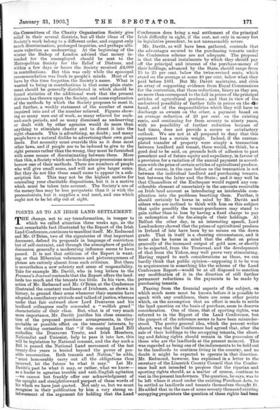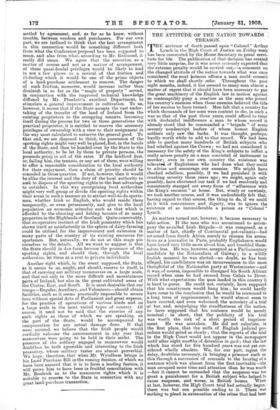POINTS AS TO AN IRISH LAND SETTLEMENT. T HE change, not
to say transformation, in temper to which we called attention three weeks ago, as the most remarkable fact illustrated by the Report of the Irish Land Conference, continues to manifest itself. Mr. Redmond and Mr. O'Brien, two of the signatories of that important document, defend its proposals in language of conviction but of self-restraint, and through the atmosphere of public discussion generally a moderating influence seems to have passed. It is not that criticism of the Report is want- ing, or that Hibernian vehemence and picturesqueness of phrase are entirely absent from such criticism. But there is nevertheless a new sobriety and sense of responsibility. Take for example Mr. Davitt, who in long letters to the Freeman's Journal contends that the Report offers the land- lords too much and the tenants too little. In his view, the action of Mr. Redmond and Mr. O'Brien at the Conference illustrated the constant readiness of Irishmen, as shown in history, to ground their arms whenever their enemies have adopted a conciliatory attitude and talked of justice, whereas under that fair outward show Lord Dunraven and his landlord colleagues really concealed a "wolfish greed" characteristic of their class. But, what is of very much more importance, Mr. Davitt justifies his close examina- tion of the proposed purchase arrangements, in their probable or possible effect on the tenants' interests, by the striking contention that "if the coming Land Bill embodies the Dunraven Treaty, and Irish Members, Nationalist and Unionist, help to pass it into law, this will be legislation by National consent, and the day such a Bill is passed the National Land movement of the last twenty-five years is buried beyond the power of pos- sible resurrection. Both tenants and Nation," he adds, 4.` must honourably carry out all the obligations thus incurred, let the future be what it may." Let Mr. Davitt's past be what it may, or rather, what we know— as a leader in agrarian trouble and anti-English agitation —we cannot but frankly offer our acknowledgment of the upright and straightforward purport of these words of Ins which we have just quoted. Not only so, but we must !tcognise in their publication by him a very strong re- inforcement of the argument for holding that the Land Conference does bring a real settlement of the principal Irish difficulty in sight, if the cost, not only in money but in legislative precedent, be not unreasonably severe.
Mr. Davitt, as will have been gathered, contends that the advantages secured to the purchasing tenants under the Conference scheme are not adequate. The proposal is that the annual instalments by which they should pay off the principal and interest of the purchase-money of their holdings, advanced by the State, should range from 15 to 25 per cent. below the twice-revised rents, which stand on the average at some 40 per cent. below what they paid before 1881. But Mr. Davitt maintains, and cites an array of supporting evidence from Royal Commissions for the contention, that these reductions, heavy as they are, no more than correspond to the fall in prices of the principal articles of agricultural produce ; and that in view of the undoubted possibility of further falls in prices on the 4e band, and of the responsibilities which they will have to discharge as owners on the other, a payment based on an average reduction of 20 per cent. on the existing rents, and continuing for from seventy to ninety years, with no possibility of further reduction because of bad times, does not provide a secure or satisfactory outlook. We are not at all prepared to deny that this argument has a certain weight. Indeed, if the contem- plated transfer of property were simply a transaction between landlord and tenant, there would, we think, be a good deal to be said, on grounds both of adhesion to past precedent and of future equity and expediency, in favour of a provision for a variation of the annual payment in accord- ance with the price of certain articles of agricultural produce. But, of course, in the case before us the transaction is not between the individual landlord and purchasing tenants, but between the latter and the State ; and it may well be that Chancellors of the Exchequer would regard any con- siderable element of uncertainty in the amounts receivable on Irish land account as introducing an intolerable com- plication into the problems besetting them. Further, it should certainly be borne in mind by Mr. Davitt and others who are inclined to think with him on this subject that quite possibly the tenant-purchasers may stand to gain rather than to lose by having a fixed charge to pay in redemption of the fee-simple of their holdings. At Belfast the other day, in an interesting speech, Lord Londonderry showed that the prices of agricultural produce in Ireland of late have been by no means on the down grade. That in itself is a cheering circumstance, and it must also be borne in mind that the effect on prices generally of the increased output of gold now, or shortly to be expected, from the Transvaal, and the development of that from the Yukon, may well prove very stimulating. Having regard to such considerations as these, we can hardly think that public opinion—supposing it to be won to acquiescence in something like the scheme of the Land Conference Report—would be at all disposed to sanction any modification of it in the direction of still further permanent reductions in the payments to be made by purchasing tenants.
Passing from the financial aspects of the subject, on which much more must be known before it is possible to speak with any confidence, there are some other points which, on the assumption that an effort is made to settle the land question on the basis of purchase, seem to deserve consideration. One of these, that of sporting rights, was referred to in the Report of the Land Conference, but the purport of the reference seems to have been misunder- stood. The pretty general idea, which the present writer shared, was that the Conference had agreed that, after the sale of their holdings to the occupying tenants, the shoot- ing and fishing rights should remain in the possession of those who are the landlords at the present moment. This was regarded as being one of the inducements to be held out to the landlords to continue living in the country, and no doubt it might be expected to operate in that direction. Mr. Redmond, however, has explained in a letter to the secretary of the Limerick County Council that the Confer- ence had not intended to propose that the riparian and sporting rights should, as a matter of course, continue to vest in the present landowners. The question, he says, was to be left where it stood under the existing Purchase Acts, to be settled as landlords and tenants themselves thought fit. He added that in the case of some seventy thousand existing occupying proprietors the question of these rights had been settled by agreement, and, as far as he knew, without trouble, between vendors and purchasers. -For our own part, we are inclined to think that the best arrangement in this connection would be something different both from what the Conference proposal has- been supposed to mean, and also from what, according to Mr. Redmond, it really did mean. We agree . that. the retention, as a matter of course and not as a matter of arrangement, of these quasi-feudal privileges would be likely to lead in not a few places to a revival of that friction and ill-feeling which it would be one of the prime objects of a land-purchase settlement to remove. The danger•of such friction, moreover, would increase rather than diminish in so far as the "magic of property" served, in conjunction with the improved technical knowledge diffused by Mr. Plunkett's excellent Department, to stimulate a general improvement in cultivation. To us, however, it seems that if the State accepts the vast under- taking of the transfer of the land of Ireland from the existing proprietors to the occupying tenants, becoming itself during the process for two or .three generations the practical proprietor, it is entitled to reserve the accessory privileges of ownership with a view to their assignment in the way most calculated to subserve the general good. To that end, we are disposed to think, the possession of the sporting rights might very well be placed, first, in the hands of the State, and then•be handed over by the State to the local authority, to be let by them to private persons, the proceeds going in aid of the rates. If the ,landlord first, orrfailing, him,the tenants, or any set of them, were willing to offer a reasonable consideration to the local authority for their enjoyment, then a claim of priority should be conceded in those quarters. If not, however, then it would beelike the interest and the duty of the local authority to seek to dispose of the sporting rights to the best advantage to outsiders. In this way enterprising local authorities might very well group or divide the sporting rights within their areas in such a manner as to attract well-to-do sports- Men, whether Irish or English, who would reside there temporarily, or even permanently, and give to the local population an economic stimulus such as that which is afforded by the shooting and fishing 'tenants of so many properties in the Highlands of Scotland. Quite conceivably, that co-operative instinct of the Irish peasantry which has shown .itself so satisfactorily in the sphere of dairy-farming could be utilised for :the improvement and extension in Many parts of the country of its existing resources for sportsmen. But, naturally, we do not at this stage pin ourselves to the details. All we want to suggest is that the State should in due form become the possessor of the sporting rights, and. should then, through the local authorities, let them at a rent to private individuals.
'Another right which, in the event supposed, the State, as it seems to us, might, and should, reserve to itself, is that of carrying out military manceuvres on a large scale, and that uot only in the mom difficult and mountainous parts of Ireland, but also in the great cultivated areas of the Centre. East, and South. It is most desirable that our troops—Regular, Auxiliary, and Volunteers—should obtain facilities, such as it seems practically impossible to secure here without special Acts of Parliament and great expense, for the practice of operations of various kinds and on a large scale in the most varied types of country. Of course, it need not be said that the exercise of any such rights as those of which we are speaking, on the part of the State, would be accompanied by coMpensation for any actual damage done. If that were secured, we believe that the Irish people would cordially welcome the announcement in any year that manceuvres were going to be held in their midst. The presence of the soldiery engaged in manceuvres would doubtless be both agreeable and interesting to the Irish peasantry, whose military tastes are almost proverbial. We hope, therefore, that when Mr. Wyndham brings in his Land Purchase 13ill in the coming Sesaion, of which we have been assured that it is to form a leading feature, it will prove him to have been in fruitful consultation with Mr. Brodrick as to the manceuvre rights which it is suitable to reserve to the State in connection with any great land-purchase transaction.























































 Previous page
Previous page